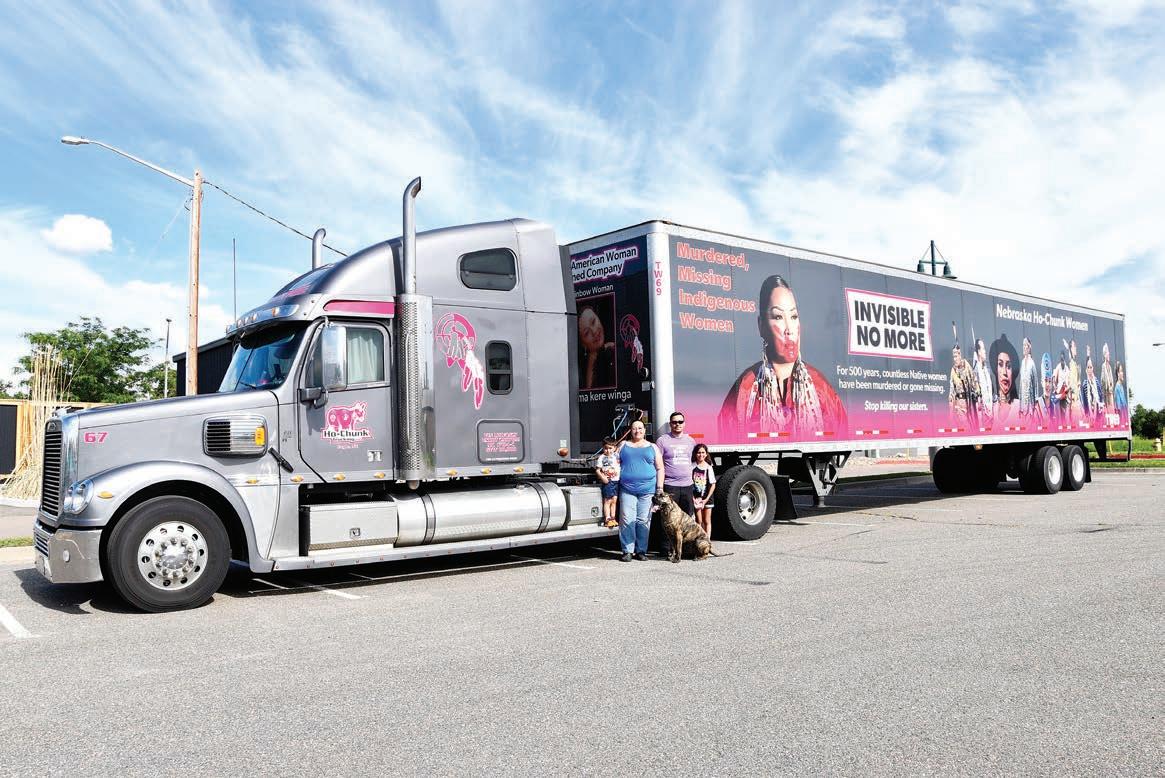
5 minute read
MESSAGE
Department of Justice database. According to the National Institute of Justice, as of May 2023, 84.3% more than 1.5 million American Indian and Alaskan Native women experience violence in their lifetime. Victimization of American Indian and Native woman is 1.2 times higher than white women.
On a mission
Johnson and her family moved to Winnebago when she was ve and she was raised as a tribal member of the Nebraska Ho-Chunk tribe, and given the name Rainbow Woman.
She left home when she was in her preteens and has kept moving.
“I don’t know if God would bless me to go further in my trucking industry or this is the end of my travels but when I see family I want to make an apple pie,” Johnson said.
Nebraska is always her home, she said, but Brighton, where her son and my grandchildren live, is her second home. She spends half her time with them.
Johnson started her mission because she was a victim of abuse herself. It was a two-way abusive situation, she said: He was abusive to her, but she fought back.
“He would put me on his lap with a knife at my throat. It was a toxic relationship; I left, and I was done. As soon that door closed, God, or wherever you want to believe, started to open other doors for me,” Johnson said.
She had worked as a construction driver in the summer and fall. She was laid o in the winter but guaranteed to return in the summer. Even so, she said she needed a more consistent job and she needed reliable transportation to do that. She found a pick-up truck she liked and approached a bank looking for a loan.
“ ey never wanted to give me a loan but I told them if you don’t give me a loan, I’m going to go somewhere else,” she said. “ is is income that comes to your bank and comes back out. ey gave me the loan and I purchased a brandnew Silverado. When I purchased the truck, that was when I left the man. I thought I was going to die leaving him and was heartbroken, but I left.”
Johnson said she drove the Silverado for a while and although it was nice to drive a cute truck, she was still broke.
“I went back to the bank and asked for a loan to trade o the Silverado for a used semi to make money,” she said. “I told the banker it was a win-win; I could make money at the same cost Silverado,” she said. “ e woman sat across from me and said, ‘I’m going do it for you’. Usually, they didn’t give business loans.” at opened a door for Johnson, and she started her trucking company, Ho-Chunk Trucking, in 2017. After a couple of years, she was able to upgrade and buy a new semitruck. en, after a couple’s years of hauling other companies’ trailers, she took out another loan and purchased her own trailer in 2020.
“I wanted my own trailer because women in the industry are treated badly; it’s a whole other story,” Johnson said.
Traveling platform
Johnson said that once she had a trailer she started thinking about it as a platform for other Native American women.
“I went through hell and back. What is the message I wanted to say to the world?” she said.
Johnson decided to do a custom wrap on her trailer with a message about indigenous women missing and murdered. She also included pictures of her family dressed in regalia and a friend dancing pow-pow and included information about 500 gone missing or murdered women.
One photo, showing a woman with a red hand over her mouth, is her niece Jalisa Horn who was left for dead from abuse and had to crawl to get help. Horn agreed to add her photo to draw attention to the message, “Murdered, Missing Indigenous Women.”
State laws
Governor Jared Polis signed SB22150, a law requiring o cial reports of missing indigenous people within eight hours. Missing children must be reported to law enforcement within two, under the law. e act also requires the Colorado Bureau of Investigation to work on investigating missing or murdered indigenous persons and also work with federal, state, and local law enforcement to e ectively investigate the cases.
In addition, an alert system and an agency called “Missing and Murdered Indigenous Relatives” are responsible for reporting and improving the investigation of missing and murdered Indigenous women and addressing injustice in the criminal justice system.
HOWLAND
Anthony M Howland October 14, 1947 - November 3, 2021
Anthony M. Howland, 74, of Brighton, CO passed away on November 3, 2021. He was born on October 14, 1947. Anthony is survived by his son, Jarett Howland.

Dominguez
Leonard Dominguez
August 28, 1958 - June 9, 2023
Leonard Dominguez 64, passed away peacefully June 9th. Leonard was born to Manuel Pacheco Dominguez and Mary Reynaga on August 28th 1958. Leonard grew up in Fort Lupton, attended Fort Lupton high school and went on to learn several di erent trades.
In 1999 he married Grace Adams in New Zealand. Leonard enjoyed spending time reading the Bible and volunteering at several ministries with Mark Roggerman. Leonard also enjoyed time he spent in New Zealand with Grace, Esther and her family. Leonard is survived by one daughter Esther (22) and grandson Israel (4) and one on the way, his brother Robert (Sharon) Dominguez and many nephews and nieces. Leonard is preceded in death by his wife Grace, mom and dad Mary and Manuel Dominguez, and brothers Manuel Dominguez, Jimmy Dominguez, John Dominguez and sister Rosalie Roggerman. Services will be determined at a later date. e Katayama Family were interned at Poston Relocation Center in AZ. Upon their release they moved to the Tonville area in Colorado. Mack often told stories of how di cult this time was on their family and they really had nothing. ey eventually settled in Brighton, where he lived till his passing on June 7, 2023 at the age of 90. Mack graduated from Brighton High School in 1951. (He enjoyed attending his class reunions). He served in the U.S. Army during the Korean War with the 3rd Engineer Company C Battalion 24. He was very proud of his experience and got to meet some relatives in Japan.
Masaru (Mack) Katayama was born in Salinas, California, the youngest of four children. His family had successful farm which was taken away from them with the Executive Order 9066.
Returning home Mack utilized the GI bill and was able to attend some higher education in Kansas City, but was cut short to come back to help his family’s struggling farm.
Mack later worked for Boise Cascade and Component and Construction Company. In the 70’s Bob Hill, Mack and Bill Stephen formed a development company, HKS. Mack built many houses and had his hand in several projects throughout Brighton and surrounding areas.
He helped many people out throughout his lifetime in a lot of di erent ways. He said he missed the days where you knew people around town and people would just help to help one another. To know Mack you were bound to hear a story or learn something. ( ere are so many life stories we could never include them all.)
His friends and family meant a lot to him. He had saved cards, holiday notes, graduation announcement, thank you notes and funeral programs
Mack was able to travel throughout the US, the only state he never made it to, Hawaii. For many years on Sundays and holidays he and friends could be found up at the “hill”. In his later years you could set your clock on his lunch and dinner routine.
Proceeded in death by his siblings Joe, Jane (Watanabe), Charlie, Yo (Miyoshi) and several friends. He leaves behind his sibling’s families, great neighbors and many friends. (You know who you are.)


We thank all those who cared for Mack during the last few years.

A special thanks to friends and family that were able to visit him over the recent years. He was his very independent self until the end.
We are sorry, per Mack’s request (in capital letters) he did not want any services.








